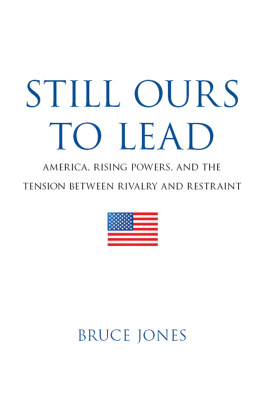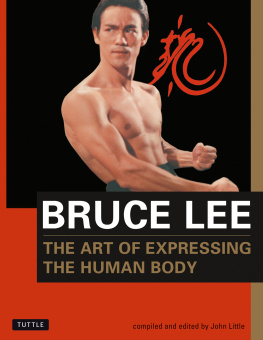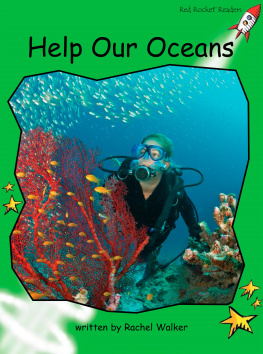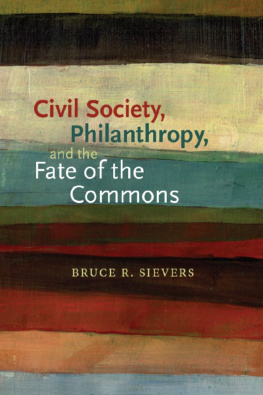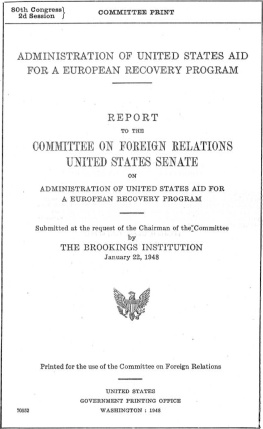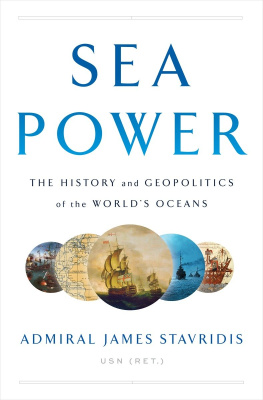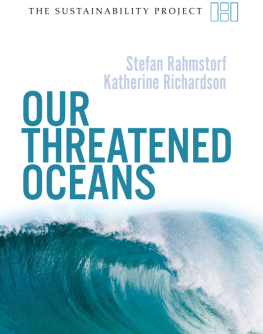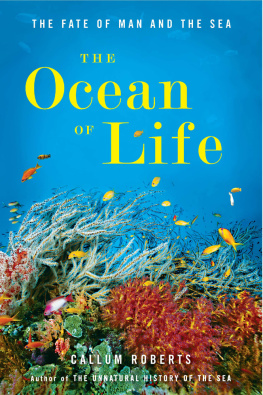Bruce Jones - How Control of the Worlds Oceans Shapes the Fate of the Superpowers
Here you can read online Bruce Jones - How Control of the Worlds Oceans Shapes the Fate of the Superpowers full text of the book (entire story) in english for free. Download pdf and epub, get meaning, cover and reviews about this ebook. year: 2021, publisher: Scribner, genre: Politics. Description of the work, (preface) as well as reviews are available. Best literature library LitArk.com created for fans of good reading and offers a wide selection of genres:
Romance novel
Science fiction
Adventure
Detective
Science
History
Home and family
Prose
Art
Politics
Computer
Non-fiction
Religion
Business
Children
Humor
Choose a favorite category and find really read worthwhile books. Enjoy immersion in the world of imagination, feel the emotions of the characters or learn something new for yourself, make an fascinating discovery.

- Book:How Control of the Worlds Oceans Shapes the Fate of the Superpowers
- Author:
- Publisher:Scribner
- Genre:
- Year:2021
- Rating:4 / 5
- Favourites:Add to favourites
- Your mark:
- 80
- 1
- 2
- 3
- 4
- 5
How Control of the Worlds Oceans Shapes the Fate of the Superpowers: summary, description and annotation
We offer to read an annotation, description, summary or preface (depends on what the author of the book "How Control of the Worlds Oceans Shapes the Fate of the Superpowers" wrote himself). If you haven't found the necessary information about the book — write in the comments, we will try to find it.
Bruce Jones: author's other books
Who wrote How Control of the Worlds Oceans Shapes the Fate of the Superpowers? Find out the surname, the name of the author of the book and a list of all author's works by series.
How Control of the Worlds Oceans Shapes the Fate of the Superpowers — read online for free the complete book (whole text) full work
Below is the text of the book, divided by pages. System saving the place of the last page read, allows you to conveniently read the book "How Control of the Worlds Oceans Shapes the Fate of the Superpowers" online for free, without having to search again every time where you left off. Put a bookmark, and you can go to the page where you finished reading at any time.
Font size:
Interval:
Bookmark:
When I first began work on this book, it was little more than an impulse, a sense that by shifting perspective to the oceans I could help illuminate the huge changes in world affairs unfolding around us. I had always been drawn to the sea. I spent much of my youth on the beaches of the Caribbean, in the pounding surf of the Atlantics Gulf of Guinea, on trips across the cold Baltic, and in the warm turquoise waters of the western edges of the Indian Ocean. Later, professional travels took me to the Mediterranean, the East China Sea, the Norwegian, the Red, the Black, the North, and the Japan Seas, across the Pacific Ocean, and to the Persian Gulf. I eventually settled in Washington, DC, near the shores of the Chesapeake Bay, playground of sailors, great inland fishery, and home of the US Naval Academy. Of the worlds storied bodies of water, only the Southern Ocean, the Arctic, the Andaman, and the South China Sea had eluded meuntil the research for this book took me to two of them.
I decided, after some reflection, to structure this book as a kind of voyage, both narrative and intellectual. Doing that required a physical voyage as well, to the many ports of call depicted in the text. And that, in turn, required help from many different groups of people. My deepest gratitude is to the captains who gave so generously of their time and knowledge to help inform my study: in particular Captain Watts of the USS John Paul Jones, Captain Tama of the US Coast Guard, and Captain Jensen of the Madrid Maersk.
Many other people supported informative visits. In Norway, the Wilhelmsen team facilitated my trip to the remarkable Olavsvern naval facility: my thanks to Brigadier General (ret.) Stener Olstad; Commander (ret.) Geir Bentzen; Rune Danielsen, CEO at Olavsvern Group; and, above all, Vidar Hole, CEO of Wilnor Governmental Services. In Shanghai, it was through the good offices and gracious hospitality of Weng Jiyi, Founding Partner, Shanghai Ivy Investment Company, that I was able to visit the vast container yard at Yangshan Port on Donghai Island; my thanks as well to Cheng Li and Ryan McElveen. In Copenhagen, Graham Slack of Maersk was both a terrific intellectual interlocutor and enormously generous in facilitating access to the companys museum and records, meetings with the leadership team, and my trip on the Madrid. Im grateful also to Robert M. Uggla, CEO of A.P. Mller Holding A/S; Sren Skau, CEO of A.P. Mller-Maersk A/S; Henning Morgen; and Zhu Shuang Lim, for their time and interactions over the course of the project. The Customs and Border Protection offices in New York graciously facilitated my site visit to their inspection facility in Elizabeth, New Jersey. In Hawaii, Stephen Frano of the INDOPACOM headquarters staff graciously arranged talks with the command leadership. In Singapore, Lynn Kuok, of the International Institute for Strategic Studies, used her formidable network to get me access to the Changi Naval Base, where Col. Raymond Ong briefed me on Singapores vital counter-piracy coalition effort.
Other people gave generously of their time or their scholarship. They include: CDR Brendan Stickles, USN, special adviser for defense in the office of the vice president of the United States; Robert O. Work, senior counselor for defense, Center for a New American Security; Thomas C. Ramey, former chairman and president of Liberty Capital, and avid fly fisherman; Michael Butt, OBE, cofounder of AXIS Capital and formerly of Lloyds of London; my friend Carlos Pascual, now senior vice president for global energy and international affairs at IHS Markit; Captain Michael Lachowicz, Coast Guard Atlantic Area; Adam Tooze of Columbia University; Vivian Tan and Annie Ho from C. H. Tungs office in Hong Kong; and the staff of the C.Y. Tung Maritime Museum at Jiao Tong University.
The voyage was the narrative; but the substance behind it was learned mostly from my colleagues in Washington, DC; New York City; and Palo Alto. Most important were those at the Brookings Institution. Im very grateful to Strobe Talbott and John Allen, the two presidents of the Institution under which Ive served, for their unstinting support to my research. Deep thanks are owed also to Ted Gayer, as well as to John Thornton, David Rubinstein, Suzanne Nora-Johnson, and Glenn Hutchins. I owe a particular debt of gratitude to Martin Indyk for supporting my career at Brookings and encouraging me to undertake a major writing project even when my day job lay more in management than research. As I do to vice president Suzanne Maloney, for her long support of my work at Brookings, for her leadership, and for her deep intellect and fierce commitment to principle; and to Michael OHanlon, research director, for his unstinting collegiality, sharp book sense, and relentless intellectual energyand helpful suggestions on the first draft of the manuscript. My colleagues in the project on international order and in the Center on Security, Strategy, and Technology played a particularly important role in shaping my thinking over many yearsa warm thank-you to Tom Wright, Bob Kagan, Tarun Chhabra, Tanvi Madan, Vanda Felbab-Brown, Fiona Hill, David Victor, Tom Stefanick, and Frank Rose; as well as colleagues in the Asia centers, particularly Lindsey Ford, Ryan Hass, Mireya Solis, and Cheng Li. I owe an additional debt to Rush Doshi both for his scholarship and for helping me navigate the fierce debates that surround the question of Chinese naval ambition. I am also grateful to two anonymous reviewers for their helpful comments and to Joshua Meltzer and Samantha Gross for comments on the draft. Additional thanks to Peter Fitzgibbons.
It goes almost without saying that none of these people are responsible for errors of omission or commission in the book; those are my responsibility alone.
Throughout my time at Brookings, I have also been fortunate to enjoy the support of the Foreign Policy Leadership Council. Im especially grateful to the three individuals who served as Chair or Co-Chairs of the Council during my tenure: Benjamin Jacobs; Jonathan Colby; and David Weinberg. Each of them in their own way encouraged, challenged, and supported me.
Several other colleagues either played a critical role in helping me with this book, or in keeping me sane in other parts of my work, thereby freeing up some part of my brain to begin piecing together this puzzle. I owe a multidimensional debt of gratitude to Emilie Kimball, Andrew Moffat, and Will Moreland. Interns are the unsung heroes of scholarship and writing; I was fortunate to draw on help at various stages of the project from Samantha Diaz, Kizzy Dhaliwal, and Nikita Salgame; Holly Cohen and Tim Holman provided additional support. Kendrick Foster took time out from his undergraduate studies to help me in the late stages of the project, including with the laborious effort of fact-checking and compiling the bibliography. As the project was moving through production, Adam Twardowski and Leah Dreyfuss provided invaluable support. But above all, I relied on the support, research assistance, prodding, and occasional pointed (and well-deserved) critiques from Katherine Elgin, without whom I could not have completed the text.
Chris Peters is a Brookings photographer, and a huge asset to any project. Two of his photographs adorn the interior of the book, and his stunning drone videos of my trip around New York Harbor and of the arrival of the Madrid Maersk in Tanjung Pelepas do much to illustrate the simply enormous scale of sea-born global trade; they can be viewed on the Brookings website. Im grateful to him, and to Emily Horne, Anna Newby, Andrea Risotto, Suzanne Schaefer, Rachel Slattery, and Ted Reinnert for their support along the way.
Words on a page are one thing; a book is quite another. When I gave Bridget Wagner Matzie, of Aevitas Creative Management, a list of possible projects that ranged in degree of somberness and scholarly merit, I listed this project last, realizing that it was the most ambitious. That she could immediately see both that this was the project I was passionate about, and that it had potential, is testimony to her book smarts; Im grateful to her for her confidence and excellent support along this process. As I am to Colin Harrison, vice president and editor in chief at Scribner, who didnt throw me out of his office when I naively asked him whether it was possible to market a book that married the techniques of narrative reportage and scholarly researchand then did much to help lift the text and make it more accessible than I could possibly have managed without him. My thanks also to Emily Polson and the rest of the excellent team at Scribner and Simon & Schuster, including Brian Belfiglio, Clare Maurer, and Zoey Cole.
Font size:
Interval:
Bookmark:
Similar books «How Control of the Worlds Oceans Shapes the Fate of the Superpowers»
Look at similar books to How Control of the Worlds Oceans Shapes the Fate of the Superpowers. We have selected literature similar in name and meaning in the hope of providing readers with more options to find new, interesting, not yet read works.
Discussion, reviews of the book How Control of the Worlds Oceans Shapes the Fate of the Superpowers and just readers' own opinions. Leave your comments, write what you think about the work, its meaning or the main characters. Specify what exactly you liked and what you didn't like, and why you think so.

